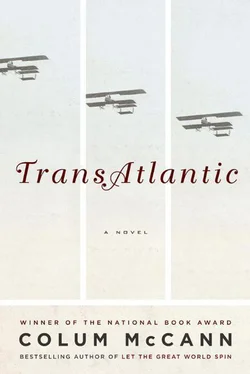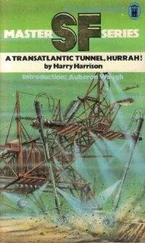The doors of the bank were equipped with a series of confounding alarms. I was as touchy as a triggered trap. When I finally got inside they told me that I had to leave Georgie outside, that dogs were not allowed. I told the poor young clerk that I was not only deaf, but blind, too, and that Georgie was the only one around who had a Ph.D. in civil engineering, hence the only way I could pass their ridiculous Alcatraz.
“I’ll see what I can do, Mrs. Carson.”
I could see them conferring in the corner. Their little bespectacled cabal. They bobbed back and forth, little Halloween apples. The manager himself crossed in the glass behind and looked out at me, rather worried. I gave him an enormous wave. He surprised me by reciprocating, and I thought to myself that perhaps we could have a decent battle, he and I, but then I realized that there was nothing safe about a game of brinksmanship when, quite literally, my heritage was at stake.
I was made to wait forty-five minutes. Waves of claustrophobia came at me. The unhealthy illusion that I could deal with them was coupled with a dread that they would somehow lead me away in handcuffs. Georgie’s bladder was up to its usual tricks and she let loose a stream over by the fake flowerpots. I was adolescently proud of her and fed her a handful of treats. She lay down and nuzzled against my feet. The afternoon light was fading outside. I watched the to-and-fro of the customers. My mother would never have stood for it. She would have been acutely offended, simply to be called into the bank, let alone to have them question her accounts and threaten her home. She had so loved rebuilding the cottage over the years: new windows, insulation, the sunroom. Even in her last years, pushing herself around in a wheelchair, she still obsessively wanted to make sure the walls were washed, the door handles oiled, the frames waterproofed.
Simon Leogue finally slid across the floor towards me. A gray suit. Sandy haired. Sharp-faced. Thirty-seven or thirty-eight years old, it’s increasingly difficult for me to tell anyone’s age. He glanced down at where Georgie was lying and said that he’d be happy for one of his employees to take the dog outside for what he called a wee stroll . I told him the dog was quite all right, thank you very much, and was tempted to berate his attempt at a northern accent but decided against it.
“Would you like to come to the back office, Mrs. Carson?”
“I’d rather conduct my business here, thank you. I have nothing to be ashamed of. You can call me Hannah. I’m not a tombstone.”
“Of course not,” he said.
He had quick eyes. He flicked a look at Georgie. Undid an elastic strap from around a folder. His fingernails were not well groomed. There were red welts at the quick of his thumbs. But his hands disappeared when he went into the rather obvious annihilation of my finances. My mortgage. My overdraft. A spear is a spear — it can be thrown from a distance or slid in slowly, perfectly placed between the ribs. He did both at once, remarkably well. I almost liked him for his cool and aplomb. He said he might have to freeze the overdraft until I sold the house. Otherwise it would be foreclosed. He remained even-keeled, artfully uninformative, said there were a number of wonderful small apartments for rent around town, or even out by the sea once my finances were properly in order. “It’s a lough, not the sea,” I said, but he shrugged as if there would never be a difference. He didn’t mention assisted living or a nursing home, which really would have sent me off the cliff. I said something ridiculous about Mayakovsky and the amortization of the soul, but even I knew it was hopeless. I had to admire the skill and unfailing politeness with which I had been very quickly outmaneuvered. He sat there, a young hound pleased with himself, and I felt denser than usual. The ancient iconography of the Irish imagination: eviction.
I said I would like to take the figures away with me and have my accountant study them properly.
He sighed heavily and slid his business card towards me. “Accountant?” He said he would give me as much time as he could, but quite frankly there wasn’t much left. “My home number is on here if it’s of any help.”
I was too self-sunken to respond. Strangely, there was a shine of grief in his eye. He blinked and looked away from me. I was terrified for a moment that he might be upset on my behalf.
“You should wash your hands better, Simon,” I said.
Georgie dwelled a little long on the floor and I yanked the leash hard, a savage thing to do, but my fury was welling towards tears, and I was not going to let it happen inside the bank.
Outside, the Bangor light stung my eyes. A surge of self-pity lodged at my breastbone. A farm tractor, of all things, trundled down Queens Parade. They are hardly seen anymore these days, but this one had a young boy at the helm, a collie dog at his heels near the gear stick. He actually smiled back and raised a forefinger from the steering wheel when I nodded. Tomas was never the sort of boy who was cut out for work on the farm. He avoided it at all costs. Preferred the boat. Why Tomas took the shotgun out with him that morning, I have no idea. He wasn’t even fond of bird hunting; it was simply the done thing, the stuff of his stepfather. In his early teens he never hunted at all. He preferred binoculars. Drifting out on the water. It all came down to vectors and angles. He wondered if there was a way to chart the natural world. There was a laze to him, our Tomas, he was never going to be one who lit up the world, but he was more than enough for me. The stolen gun never resurfaced. Who knows what history it served, or whether it was just thrown away and buried down in the bog to join the ancient elk, the bones, the butter?
I watched the tractor go, then straightened out soon enough with a quick slap of reality. The Land Rover was at the far end of the street, clamped. A pretty yellow boot. I wasn’t even about to argue with the parking attendants. They stood, surly and malevolent, at the far end of the street. I went straight back across to the bank and got the cash from the machine in the wall before Simon could freeze the overdraft.
I begged them to let me go for free, but the parking attendants exercised their abundant ability to shrug. I paid the fine, but it still took them an age to remove the boot.
Georgie was sleeping in the backseat by the time I pulled down the laneway. I went digging in the garden out back to burn off the anger, or the fear, of the day. I turned a few sods in the old tomato patch. A drizzle fell across the sky, orange in the ambient light from Bangor. One never thinks the stars will disappear. Our failed attempts at navigation. I kicked the mud off my boots and went inside. How many times do we end up scraping the muck from the mirror? There was a gallery of rogues in the passageway near the pantry where I dropped the shovel. The everyday suspects. My mother in her tennis dress, a full-bodied red wine. My father in his RAF uniform. My grandfather at the gates of a linen factory. My American grandmother on the deck of a transatlantic liner. My Tomas holding up six mackerel on a single string. Jon Kilroyan, the farmhand, outside the fisherman’s cottage. My husband in tweeds and knee-high wading boots. Neighbors and old friends from the Women’s Coalition. A photo of me out fox hunting when I was very young, a beagle trotting behind me, my whole life so apparently prearranged, the privilege aligned along my spine.
TWO DAYS OF storms. Georgie and I stayed indoors. The weather hacked across the lough. The sky was dark. Branches fell from the trees. Rain fell relentlessly. I got lost in its antiphonies.
On the third day, I left. The letter sat in the passenger seat beside me, sleeved in its archival plastic. Hardly the best way to keep it, I suppose, but short of a humidified bank vault, it would have to do.
Читать дальше












